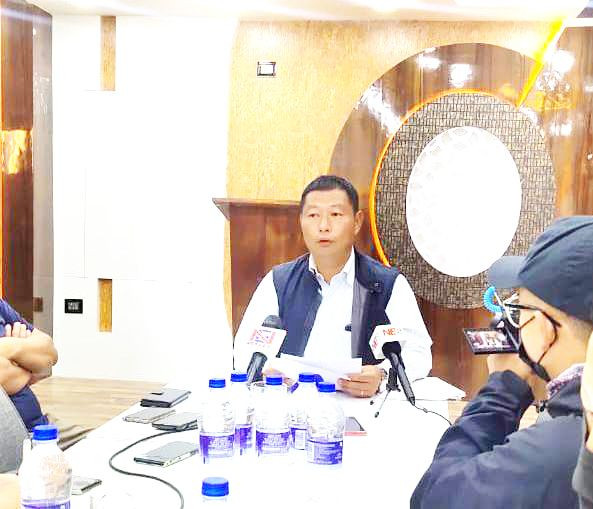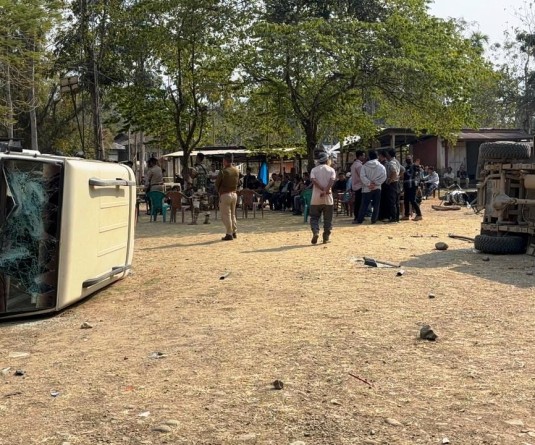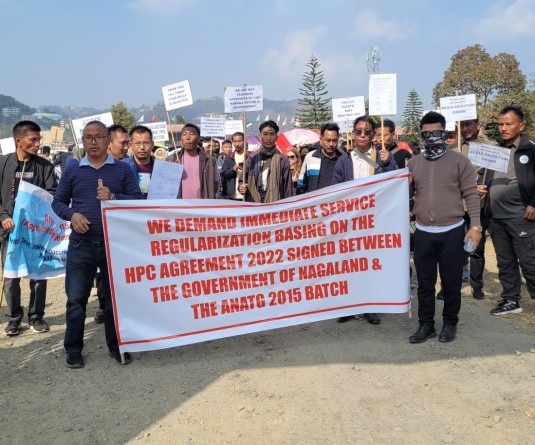Newly appointed Chairman of NBOCWWB, Kekhrie Yhome, during an interaction with media personnel at Kohima on November 11. (Morung Photo)

Morung Express News
Kohima | November 11
The Nagaland Building and Other Construction Workers Welfare Board (NBOCWWB) has assured to work towards the welfare of building/construction workers and endeavour to improve their skills.
This was stated by recently appointed Chairman of the NBOCWWB, Kekhrie Yhome during a press conference this afternoon at Hotel Crescent, Kohima. The NBOCWWB is a statutory body as well as a body corporate, a welfare oriented board with enforcement powers. It consists of 13 members for a 3 year period.
The Government of India has enacted two legislations viz. the Building and Other Construction Workers (Regulation of Employment and Conditions of Service 1996 ad BOCW (RECS) Act, 1996, and the Building and other Construction Workers Welfare Cess Act, 1996.
According to the NBOCWWB website, these are progressive legislations enacted to provide decent working environment to the construction workers in respect of their safety, security and health at the workplace besides implementing different welfare schemes especially designed for the purpose.
Although the Board was constituted in 2011 under the State Labour Department, it was informed that it will work as an independent body. The board aims to tighten the loose ends of workers welfare, both in terms of schemes and programmes, and create direct access for beneficiaries, through open access digitisation and development of user-friendly apps, Yhome stated.
Despite the availability of local construction workers, carpenters, masons etc which all come under building and construction workers category, who work both in rural and semi-urban areas, he observed that local workers are negatively discriminated with preference for migrant workers. “There is a serious gap in priorities,” Yhome maintained and said that the boards will make efforts to create awareness through various platforms.
‘Cess is not a tax or revenue’
On cess legislation, Yhome clarified that ‘cess is neither a tax nor a revenue’ and noted that Nagaland as a state has very less idea about tax cess.
The State Finance Department issued an office memorandum on February 12, 2012 and November 22, 2012 on compliance for deduction of cess under the Building and Other Construction Workers Welfare Cess Act, 1996 as per the directives of the Supreme Court of India.
“Cess is not revenue. Cess is an indicator of the quantum of physical or works development undertaken by both government of India and government of Nagaland or by its inhabitants,” Yhome explained.
Following this, he iterated that any government agencies, whether central or state, engaged in any civil works, is under legal obligation to pay 1% cess of the total project cost, which is part of the project cost, every time a part or full payment is released.
While reminding that cess defaulting departments and concerned disburse officers may attract legal actions, which may affect employment service, fines, or even imprisonment, Yhome called upon various establishments to maintain financial honesty and timely payment of cess in order not to create financial burden on public expenditures,
“Any disbursement officers found deducting cess amount and not depositing to the Welfare Board will be accordingly dealt with the rule of law” he cautioned.
Meanwhile, he reassured that the board will aspire to improve the conditions of all the building and construction workers through training and skill developments; formulate comprehensive studies on the challenge of wage-labour-migration intersections and the financial systems of money circulation and local economies.





